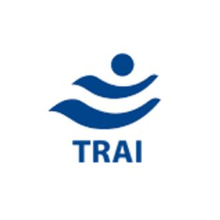Telecom Regulatory Authority of India
 | |
| Regulatory agency overview | |
|---|---|
| Formed | 20 February 1997 |
| Jurisdiction | India |
| Headquarters | Mahanagar Doorsanchar Bhawan, Jawaharlal Nehru Marg (Old Minto Road), New Delhi |
| Regulatory agency executives |
|
| Key document | |
| Website |
www |
The Telecom Regulatory Authority of India (TRAI) is the regulator of the telecommunications sector in India.[2]
History
Telecom Regulatory Authority of India was established on 20 February 1997 by an Act of Parliament to regulate telecom services and tariffs in India. Earlier regulation of telecom services and tariffs was overseen by the Central Government.
TRAI's mission is to create and nurture conditions for growth of telecommunications in India to enable the country to have a leading role in the emerging global information society.[3]
One of its main objectives is to provide a fair and transparent environment that promotes a level playing field and facilitates fair competition in the market. TRAI regularly issues orders and directions on various subjects such as tariffs, interconnections, quality of service, Direct To Home (DTH) services and mobile number portability.
In January 2016, TRAI introduced an important change in telecommunication that would benefit all consumers. Effective from 1 January 2016, consumers will be compensated for call drops. However, there is a catch, per the rule, mobile users will get a compensation of Re 1 for every dropped call but it will be limited to a maximum three dropped calls in a day. This regulation has been quashed by Supreme Court on the ground of being "unreasonable, arbitrary and unconstitutional".[4]
Secretariat
TRAI is administered through a Secretariat headed by a secretary. All proposals are processed by the secretary, who organises the agenda for Authority meetings (consulting with the Chairman), prepares the minutes and issues regulations in accordance to the meetings. The secretary is assisted by advisors. These include Mobile Network, Interconnection and Fixed Network, BroadBand and Policy Analysis, Quality of Service, Broadcasting & Cable Services, Economic Regulation, Financial Analysis & IFA, Legal, Consumer Affairs & International Relation and Administration & Personnel. Officers are selected from the premier Indian Telecommunications Service and also from the Indian Administrative Service.[5]
See also
- Telecommunications in India
- The Telecom Commercial Communication Customer Preference Regulations, 2010
References
- ↑ http://www.trai.gov.in/Content/Org_Structure.aspx
- ↑ "The Telecom Regulatory Authority of India Act, 1997 — The Centre for Internet and Society". Cis-india.org. Retrieved 2016-08-18.
- ↑ "Dropped calls may earn you Re 1 compensation - The Economic Times". Economictimes.indiatimes.com. 2015-10-16. Retrieved 2016-08-18.
- ↑ "SC strikes down 'arbitrary, unconstitutional' call drop penalty". Moneycontrol.com. 2016-05-11. Retrieved 2016-08-18.
- ↑ "TRAI Manual" (PDF).